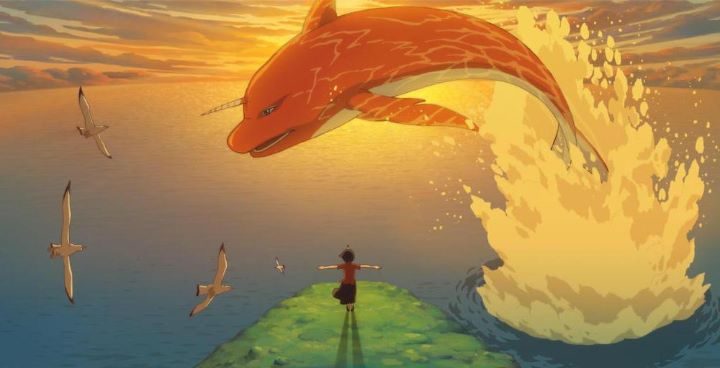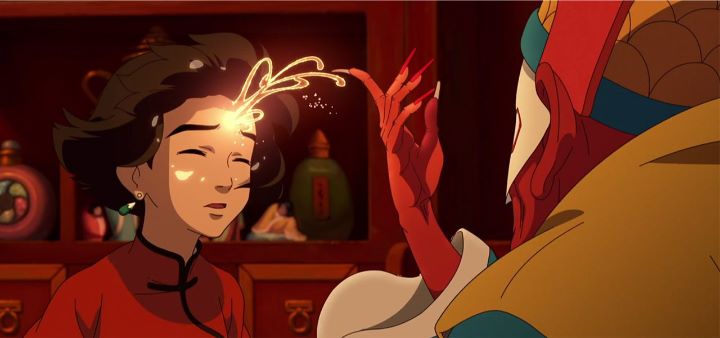








When it comes to Eastern animation from Asian markets, Japanese anime has long dominated the industry, even rivaling the quality of American cartoons and outdoing them in sheer numbers. However, most anime fans aren't aware that much animation, even from Japan, is outsourced to cheaper studios in China and South Korea. By the early 2010's, both China and South Korea had an exploding economy and their pop culture was beginning to influence global audiences. It's natural that they would also want to use the experience of their hard-working artists to produce their own animation industry, to earn the same respect as Japanese anime around the world. They have tried and (arguably) failed many times in the past, however. Which is a shame, because I've seen several examples where concept artists from these nations outdo their peers, surely high-quality animation cannot be far behind.While it is too early to tell at the time of this writing, I have hopes that "Big Fish & Begonia" will help make the impact China rightfully deserves. Initially released in 2016 in China, it eventually found a theatrical release with Funimation and Shout Factory in the USA in 2018. After over a decade of production and funding issues, the two dedicated directors were able to finish the film, which fans had claimed to be "the dawn of Chinese animation." It is proudly influenced by the culture and myths of China, and was a big hit domestically. China has a right to be proud of the picture: while it is plauged with issues that likely came from the fact that this was a first time film from a small novice studio, it also makes for an impressive fairy tale. The film supposes there exists a alternate fantasy world where God-like beings reside and oversee the laws of the natural world. Every so often, a handful of children grow of age and are sent into the human world as the form of red dolphins - you see, fish have great symbolism in this world, and all human souls will also return to become fish after they pass away. The red dolphins are to observe the human world for seven days to better understand the universe, before returning home again. Just before she was meant to return, the dolphin of Chun, a young and talented magic weilder with the power to transform plants, gets trapped in a fishing net, and seemingly will miss her chance to return to her world. A young fisherman helps the dolphin escape, but in her fear, Chun accidently knocks the boy unconcious, and he dies from drowning moments later. Horrified by her mistake and not yet understanding the natural ways of life and death, Chun returns to her world and finds a way to bring the boy back to life to return to his family in the human world. However, it comes at a great cost: she must exchange half her life, and forever tie her fate to the boy's soul (now in the form of a fish) until it grows big enough to return back to his world. Chun doesn't yet realize that the heavens will not be kind in her defiance of the natural laws, and the cost of her arrogance might be more than simply her own life.The story isn't a perfect one, and it typically comes from inconsistencies and misteps in its direction. Some lines of dialog or character actions either get repeated or are forgotten seconds later, as if someone forgot to edit out old parts of an old draft of the script. And Chinese mythology heavily and exclusively effects the film... while typically for benefit, it doesn't help that the clothing and architecture of both the human and spiritual worlds look nearly identical. I can't help but wonder if an extra pass from a third party would have helped tremendously in improving the writing as a whole. But this does not mean the story is a mistake. On the contrary, at its best, its a fantastic blend of old Chinese myths that doesn't require background knowledge to appreciate (although being familiar with the old stories would certainly help). And when tragedy hits or when characters have to make hard choices, it is an emotional tale, which does a lot to tie a viewer to the fates of the characters. This story of love and loss, friendship and family, and changing fate itself, and is impressive in its ambition. I admit I cried a little, especially for Qiu's efforts going without returns (and after finding himself covered in poop not just once, but twice, in the film's story, I can't help but feel he gets the short end of the stick despite his intentions and importance).  The art is generally impressive, largely thanks to it embracing its Chinese heritage. It's at its best when focusing on the more otherworldly deities and the magical powers of the main characters, but also finds ways to impress in subtle scenes, be it with a fish's swirl in a water bowl or a traditional dance in the air. The animation is a different story... frankly, it looks a lot like "Avatar - The Last Airbender" or "The Boondocks," which is likely not a coincidence given those American shows also outsourced their productions. This means animation that seems to use lower framerates and stiff movement. It looks like an acceptable, but cheap, animation production. Apparently, "Big Fish & Begonia" had outsourced part of its animation to South Korea, is it possible they fell prey to the practices of money-saving practices used the world over at expense of quality? There are a handful (perhaps a total of five minutes-worth) of scenes that look spectacular, both in camera framing, camera movement, and particle effect or character movement. These scenes look so different from the rest of the film, that one can't help but wonder if different artists tackled them, or if most of the film was made too quickly due to cost and timing issues. Had the best of the film's quality been consistent throughout the nearly two-hour runtime, this would be one of the most beautiful animated films of the decade. And a quick note on CGI used: typically used on background sets or objects, it doesn't try to blend nicely with the 2D animation, but it looks impressive on its own, and with the art design, I didn't mind that the parts felt separate.Comparing any animated film to that of Studio Ghibli or Hayao Miyazaki's work is something that gets tossed around far too frequently, and naturally, is typically done when describing Japanese films. I do believe "Big Fish & Begonia" is a good match for the style of Ghibli's catelog, and will likely be remembered as the "Spirited Away" of China for years to come. If the studio's next film gets better editing in its story and can surpass the animation quality China has been known for, then they can quickly find themselves respected the world over.
The art is generally impressive, largely thanks to it embracing its Chinese heritage. It's at its best when focusing on the more otherworldly deities and the magical powers of the main characters, but also finds ways to impress in subtle scenes, be it with a fish's swirl in a water bowl or a traditional dance in the air. The animation is a different story... frankly, it looks a lot like "Avatar - The Last Airbender" or "The Boondocks," which is likely not a coincidence given those American shows also outsourced their productions. This means animation that seems to use lower framerates and stiff movement. It looks like an acceptable, but cheap, animation production. Apparently, "Big Fish & Begonia" had outsourced part of its animation to South Korea, is it possible they fell prey to the practices of money-saving practices used the world over at expense of quality? There are a handful (perhaps a total of five minutes-worth) of scenes that look spectacular, both in camera framing, camera movement, and particle effect or character movement. These scenes look so different from the rest of the film, that one can't help but wonder if different artists tackled them, or if most of the film was made too quickly due to cost and timing issues. Had the best of the film's quality been consistent throughout the nearly two-hour runtime, this would be one of the most beautiful animated films of the decade. And a quick note on CGI used: typically used on background sets or objects, it doesn't try to blend nicely with the 2D animation, but it looks impressive on its own, and with the art design, I didn't mind that the parts felt separate.Comparing any animated film to that of Studio Ghibli or Hayao Miyazaki's work is something that gets tossed around far too frequently, and naturally, is typically done when describing Japanese films. I do believe "Big Fish & Begonia" is a good match for the style of Ghibli's catelog, and will likely be remembered as the "Spirited Away" of China for years to come. If the studio's next film gets better editing in its story and can surpass the animation quality China has been known for, then they can quickly find themselves respected the world over.